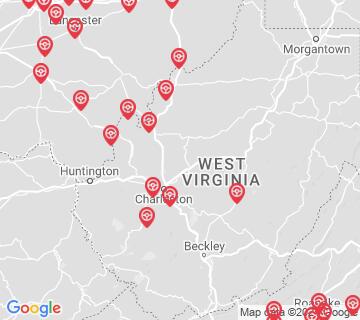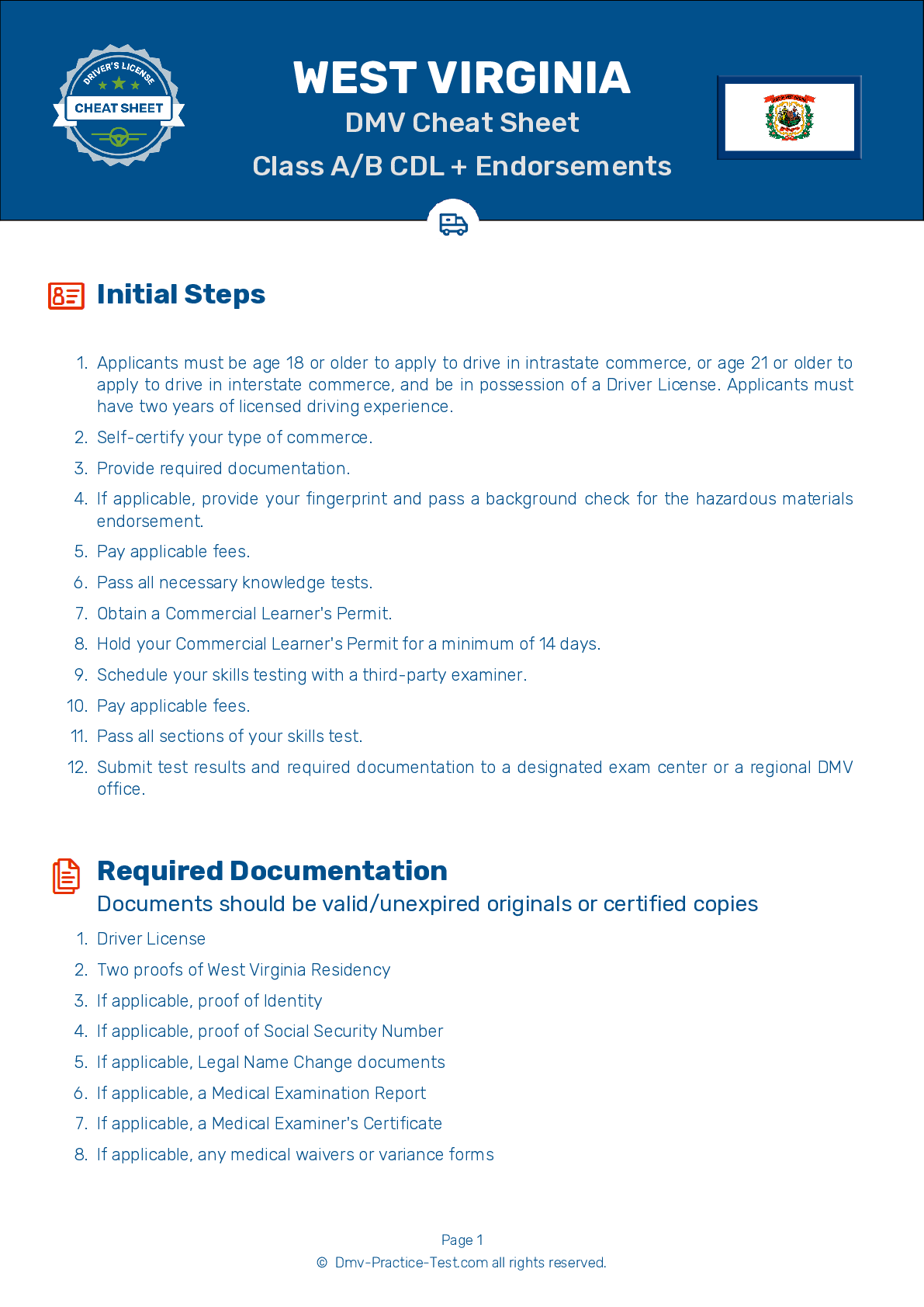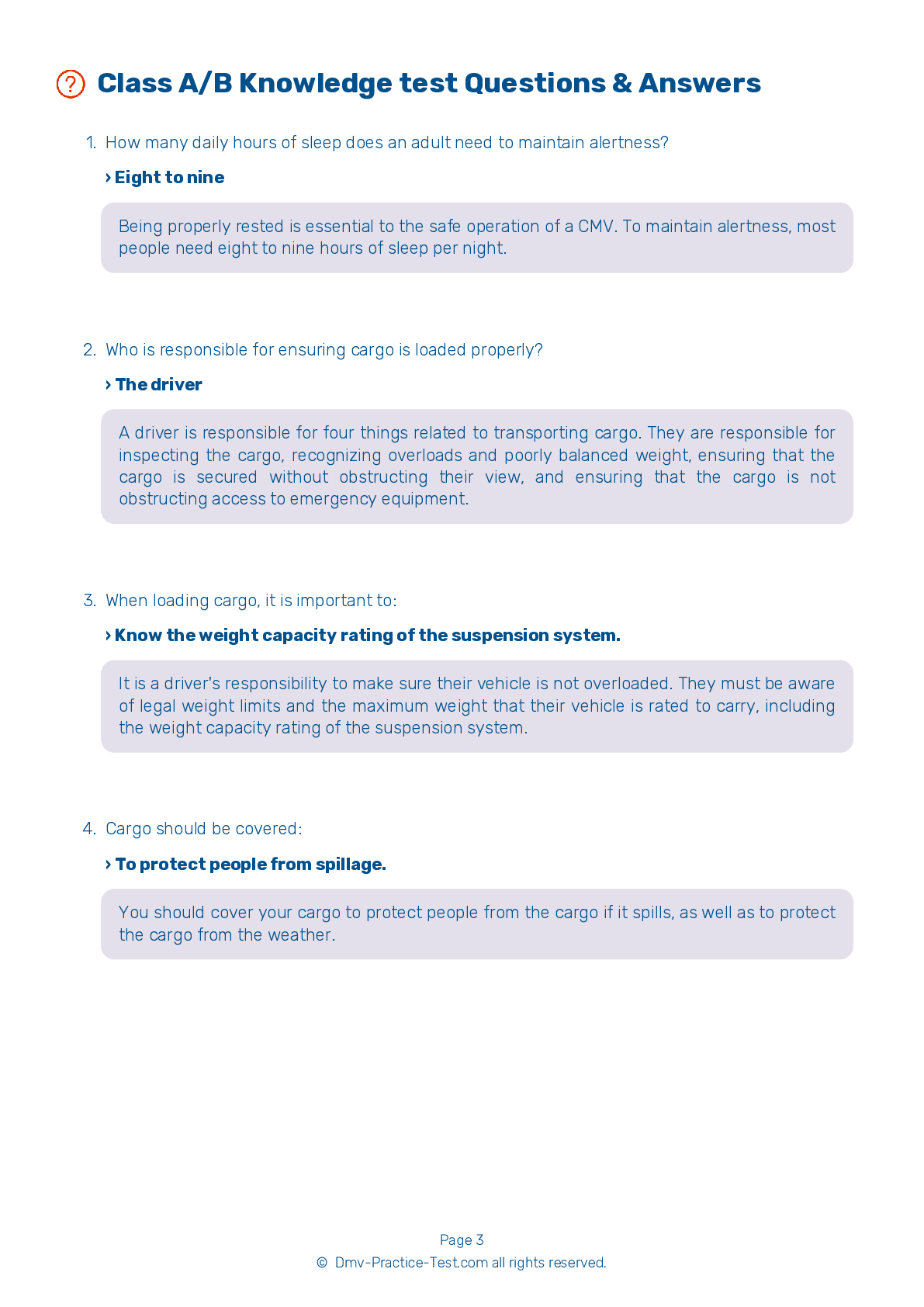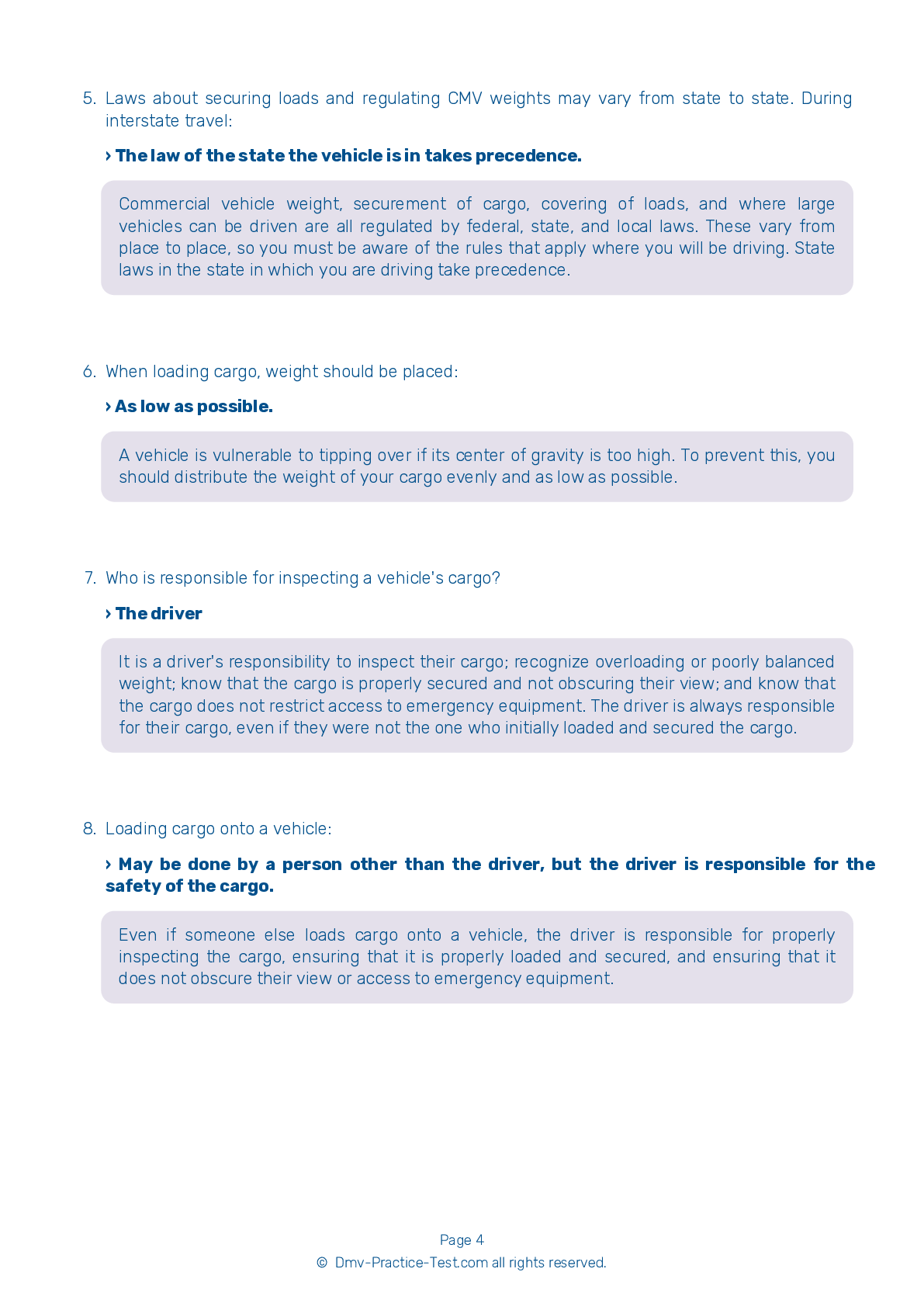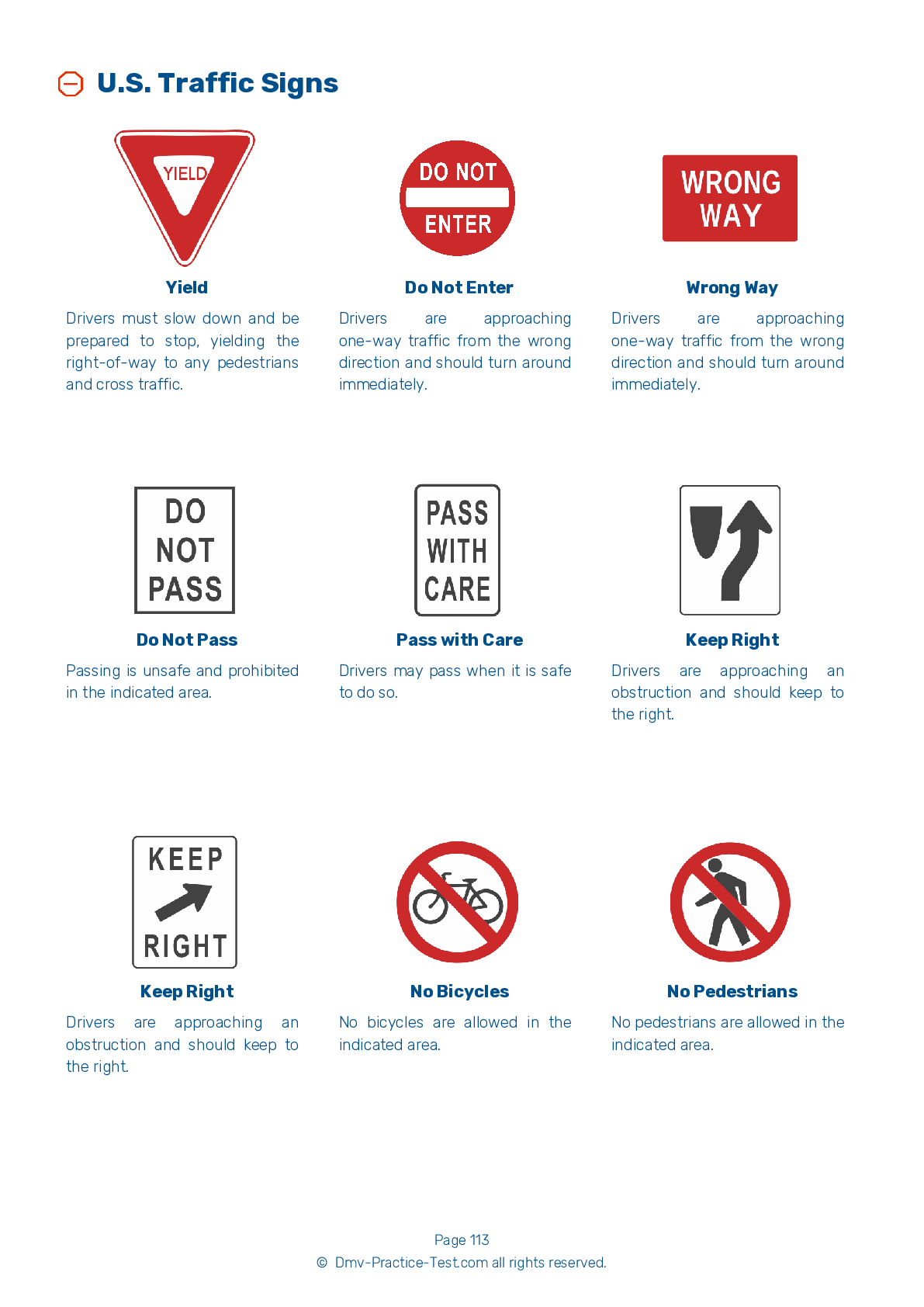Knowledge Test Class B #2
Class B Driving Test | West Virginia 2026 #2 Page 2 of 7
Train for FREE online with our West Virginia class B license test. The official exam test consists of several obligatory parts, with all of them checking your knowledge of different blocks of road rules. If you need to obtain a WV CDL class B permit in 2026, practice as much as possible. Free sample tests published on our website will help you check and improve your knowledge and boost your grades. Please bear in mind that CDL class B requirements may vary from state to state.
50
40
20
8 . A person can be denied a CDL because:
They work for a city government.
In West Virginia, a person may be denied a CDL for being a habitual consumer of alcoholic beverages or for being addicted to narcotics.
9 . While driving downhill, you should brake until you reach a speed that is ____ below your safe speed, then release the brake pedal.
20 mph
While driving downhill, you should hold down the brake pedal until your vehicle reaches a speed 5 mph below your safe speed, then release the brake pedal. Repeat this process.
10 . The maximum speed limit on an open highway, unless otherwise posted, is:
70 mph.
Unless otherwise posted, the maximum speed limit on an open highway in West Virginia is 55 mph. If another speed limit is posted, follow the posted limit.
11 . If you are unsure if there is enough space for your vehicle to safely travel under a bridge, you should:
Drive on the shoulder.
If you aren't sure that you have space for your vehicle to safely fit underneath an overhead object, slow down and seek an alternate route if possible.
12 . A cargo cover that flaps in transit:
Can attract birds.
Cargo covers should not flap in the wind. A flapping cover could tear loose entirely, exposing the cargo, and potentially blocking your view or the view of other drivers.
13 . How many daily hours of sleep does an adult need to maintain alertness?
Being properly rested is essential to the safe operation of a CMV. To maintain alertness, most people need eight to nine hours of sleep per night.
14 . When pulled off on the side of the road, a driver should:
Turn off all lights.
If you must stop on the side of the road, it is important that you turn on your emergency flashers as a warning to other drivers. This is especially important if you are stopped at night.
Search the best driving school in your neighbourhood
2026 West Virginia | Frequently Asked Questions
To acquire a CDL Hazmat endorsement in West Virginia, you must already possess a valid CDL. Then, pass the Hazmat knowledge test at a DMV office. Before the test, you need to complete a hazardous materials endorsement application and pass a TSA background check. Finally, pay the required fees to receive your endorsement.
To obtain a CDL Hazmat license, you must already possess a valid Commercial Driver's License (CDL). You should be at least 21 years old and have U.S citizenship or legal Permanent Resident status. Prior to the Hazmat knowledge test, you must pass a Transportation Security Administration (TSA) background check. Good driving record and physical fitness are also required.
When applying for a CDL Hazmat endorsement, you'll need to provide proof of U.S. citizenship or permanent legal residency (like a birth certificate or green card), your valid Commercial Driver's License (CDL), and a completed Hazardous Materials Endorsement application. You'll also need to provide fingerprints for the background check conducted by the Transportation Security Administration.
Yes, there is a dedicated written test for the CDL Hazmat endorsement. This test is designed to evaluate your knowledge of the rules and regulations related to transporting hazardous materials. It covers topics like loading and unloading hazardous materials, bulk packaging marking, driving and parking rules, and emergency response procedures.
The written test for the CDL Hazmat endorsement covers various subjects related to hazardous materials. These include identifying different types of hazardous materials, understanding shipping papers, placarding rules, loading and unloading procedures, emergency response procedures, and safety protocols. The test also covers federal and state regulations for transporting hazardous materials.
Yes, there are extra charges associated with acquiring a CDL Hazmat endorsement in West Virginia. These include fees for the written test, fingerprinting, background check, and endorsement itself. The exact amount can vary, so it's recommended to check with the local DMV for the most current fees.
Yes, background checks and security clearances are mandatory for the CDL Hazmat endorsement. This includes a fingerprint-based TSA (Transportation Security Administration) security threat assessment. The purpose is to ensure the driver doesn't pose a security risk while transporting hazardous materials.
Yes, specialized training and certification are required for the CDL Hazmat endorsement. In addition to passing the general CDL test, applicants must pass a specific Hazmat knowledge test. They must also undergo a TSA background check. The endorsement is then added to their commercial driver’s license upon successful completion of these requirements.
No, you cannot legally transport hazardous materials without a valid CDL Hazmat endorsement in West Virginia, or in any other state. This endorsement ensures that the driver has the necessary training and knowledge to handle hazardous materials safely and appropriately. Violating this requirement can lead to serious penalties.
Yes, you can add the CDL Hazmat endorsement to your current CDL license. However, it requires passing the Hazmat knowledge test and a TSA background check. Once these steps are successfully completed, the Hazmat endorsement is added to your existing CDL without needing a new license.
